
 New York Fed President John Williams. (Photo: Bloomberg)
New York Fed President John Williams. (Photo: Bloomberg)
President John Williams of the Federal Reserve Bank of New York, who is a permanent member of the Fed's policymaking Federal Open Market Committee, indicated in an appearance before The Economics Club of New York on Wednesday that the Fed is more likely to keep rates unchanged rather than to hike or lower them this year.
He expects U.S. growth will "slow considerably" from just above 3% last year to around 2% this year due to a "downturn in global growth," especially in Europe; "heightened geopolitical uncertainty," including Brexit and U.S.-China trade conflicts; and "the effects of tighter financial conditions late last year," which slowed the housing market, but are abating currently.
Williams also expects U.S. inflation will continue to stay near the Fed's 2% target. The challenge now is not that inflation will get too high but too low. That's been a problem in other countries like Japan year after year, and the Fed wants to ensure the same does not happen in the U.S., Williams said.
"The overall picture of the [U.S.] economy is as good as its gets: very low unemployment sustainable growth and inflation just about at our 2% goal," said Williams, in his speech. "The current federal funds rate of 2.4% puts us right at neutral."



